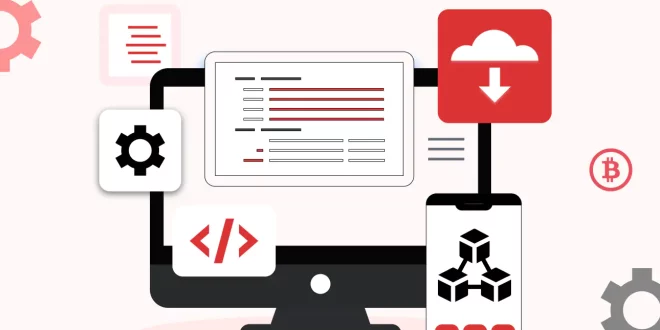In the fast-evolving digital landscape, businesses are constantly seeking innovative solutions to streamline their content management processes. Blockchain integration in CMS platforms is emerging as a game-changer, revolutionizing the way content is managed, shared, and secured. This powerful combination brings decentralization, transparency, and enhanced security to content management systems, offering a host of benefits for businesses of all sizes.
Understanding Blockchain Integration and CMS
Blockchain Integration Defined
Blockchain is a distributed ledger technology that operates on a decentralized network. It records transactions in a transparent and immutable manner, ensuring data integrity and eliminating the need for intermediaries. The integration of blockchain technology into CMS platforms allows content to be stored on a secure and decentralized network, making it resistant to tampering and unauthorized access.
CMS and Its Role in Content Management
Content Management Systems (CMS) provide organizations with a user-friendly platform to create, edit, and publish digital content. They facilitate seamless collaboration among teams and help maintain a consistent brand voice. Popular CMS platforms like WordPress, Drupal, and Joomla have become the backbone of numerous websites and online businesses.
Advantages of Blockchain Integration in CMS Platforms
Enhanced Content Security
Blockchain’s tamper-resistant nature ensures that content stored in integrated CMS platforms remains secure from cyber threats and unauthorized alterations. The decentralized architecture makes it extremely difficult for malicious actors to compromise the system, providing peace of mind to businesses dealing with sensitive data.
Immutability and Audit Trail
Every change made to content within a blockchain-integrated CMS is recorded as a new block, creating an immutable audit trail. This feature is particularly valuable for compliance-driven industries where tracking content revisions and access history is essential.
Copyright Protection and Content Attribution
Blockchain integration enables content creators to timestamp their work and establish ownership through smart contracts. This function proves invaluable in cases of copyright disputes, as the blockchain acts as an indisputable proof of creation and ownership.
Streamlined Content Collaboration
Blockchain-powered CMS platforms facilitate seamless content collaboration among teams and stakeholders. Multiple parties can access, review, and edit content simultaneously, reducing the time required to create and publish content.
Decentralization for Data Resilience
By distributing data across a network of nodes, blockchain integration ensures data resilience. In the event of a server failure or cyber attack, the content remains accessible through other nodes, minimizing downtime and data loss.
Micropayments and Content Monetization
With blockchain’s capability for handling micropayments, content creators can explore new revenue streams. Consumers can directly pay for access to premium content or services, eliminating the need for intermediaries and reducing transaction costs.
Exploring the Types of CMS Platforms with Blockchain Integration
There are several CMS platforms that have embraced blockchain integration, each offering unique features and advantages. Let’s delve into some of the most prominent ones:
Decentralized WordPress
WordPress, the world’s most popular CMS, has seen significant advancements with blockchain integration. Plugins and extensions now allow users to store content on decentralized networks, enhancing security and content ownership.
Drupal with Smart Contracts
Drupal’s integration with blockchain technology introduces smart contract capabilities for content attribution and licensing. This powerful feature ensures fair compensation for content creators while simplifying copyright management.
Joomla and Blockchain Timestamping
Joomla’s blockchain integration primarily focuses on timestamping content. This feature enables users to establish precise creation dates for their content, bolstering copyright claims.
Wix and Blockchain Data Distribution
Wix has embraced blockchain to improve content distribution across its network. Through decentralized storage, content is served to users from the nearest available node, reducing load times and enhancing user experience.
Ghost’s Immutable Publishing
Ghost, known for its simplicity and elegance, has integrated blockchain technology to create an immutable content publishing system. Writers can be assured that their work remains intact and unaltered throughout its lifecycle.
Open Source CMS Platforms: Pioneering the Blockchain Integration Movement
TYPO3’s Decentralization Initiative
TYPO3, a powerful open-source CMS, is actively exploring blockchain integration to enhance data decentralization and security. The TYPO3 community’s dedication to open-source principles aligns perfectly with the decentralized nature of blockchain technology.
Umbraco’s Decentralized Content Collaboration
Umbraco, another open-source CMS, is taking strides in enabling decentralized content collaboration. Blockchain integration in Umbraco paves the way for real-time collaboration between remote teams without compromising data security.
Grav CMS and Micropayments
Grav CMS, known for its simplicity and speed, is venturing into blockchain-powered micropayments. This integration opens new possibilities for content monetization and offers content creators a direct and frictionless revenue stream.
Overcoming Challenges and Adopting Blockchain Integration
While the potential benefits of blockchain integration in CMS platforms are immense, adoption does come with its challenges. Some of these include:
- Scalability: Blockchain networks must handle large volumes of data efficiently to be viable for widespread CMS use.
- Cost and Complexity: Implementing blockchain integration may come with additional costs and require expertise in both CMS and blockchain technologies.
- Regulatory Compliance: Businesses must navigate the legal and regulatory landscape to ensure compliance when using blockchain for content management.
Final Words
Blockchain integration in CMS platforms is undeniably empowering decentralized content management. With enhanced security, data transparency, and new monetization avenues, businesses can unlock the full potential of their content. As open-source CMS platforms continue to pioneer this movement, the future of content management is set to be decentralized, efficient, and secure.
Commonly Asked Questions
Q1: Are blockchain-integrated CMS platforms suitable for small businesses?
Yes, blockchain-integrated CMS platforms offer significant benefits to businesses of all sizes. Small businesses can particularly benefit from enhanced content security, copyright protection, and streamlined collaboration.
Q2: Does blockchain integration lead to slower content loading times?
No, blockchain integration in CMS platforms does not necessarily lead to slower loading times. In fact, certain integrations, like Wix’s data distribution, can improve loading times by serving content from the nearest node.
Q3: Can blockchain integration prevent content plagiarism?
Blockchain integration can act as a deterrent to content plagiarism by providing an immutable record of content creation and ownership. However, it is not a foolproof solution and must be complemented by other anti-plagiarism measures.
Q4: How do micropayments work in blockchain-integrated CMS platforms?
Blockchain technology enables secure and frictionless micropayments. Consumers can directly pay content creators using cryptocurrency for accessing premium content or specialized services.
Q5: Is blockchain integration in CMS platforms cost-effective?
The cost-effectiveness of blockchain integration varies depending on the CMS platform and the scale of implementation. While there may be initial setup costs, the long-term benefits of enhanced security and revenue opportunities can outweigh the investment.
 webfily
webfily


